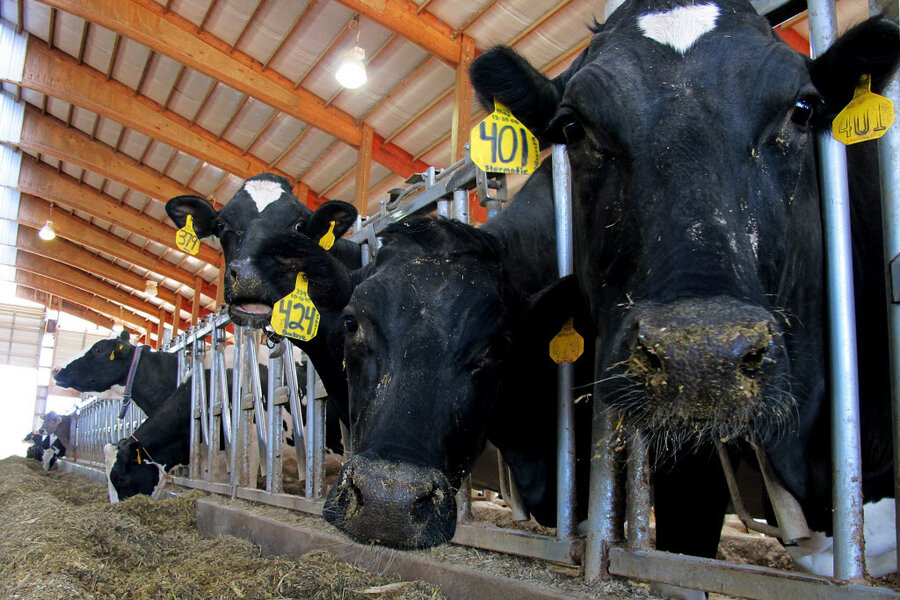Slimmed farm bill reveals waning influence of agriculture
Loading...
| Washington
A patchwork extension of federal farm programs passed as part of a larger "fiscal cliff" bill keeps the price of milk from rising but doesn't include many of the goodies that farm-state lawmakers are used to getting for their rural districts.
House and Senate Agriculture Committee leaders who spent more than a year working on a half-trillion-dollar, five-year farm bill that would keep subsidies flowing had to accept in the final hours a slimmed-down, nine-month extension of 2008 law with few extras for anyone.
With the new Congress opening Thursday, they'll have to start the farm bill process over again, most likely with even less money for agriculture programs this year and the recognition that farm interests have lost some of the political clout they once held.
"I think there's a lot of hurt feelings, that all of this time and energy was put into it and you've got nothing to show for it," said Roger Johnson, president of the National Farmers Union.
Senate Agriculture Committee Chairwoman Debbie Stabenow, D-Mich., said it even more bluntly on the Senate floor just after she learned that the bare-bones extension would be part of the fiscal cliff deal.
"There is no way to explain this," she said angrily as the deal came together New Year's Eve. "None. There is absolutely no way to explain this other than agriculture is just not a priority."
After Congress failed to pass a farm bill earlier last year, the legislation became tangled in the end-of-the-year fiscal cliff talks as dairy subsidies were set to expire Jan. 1 and send the price of milk to $6 or $7 a gallon, double current prices. The White House and congressional leaders negotiating the fiscal cliff had agreed that the bill would somehow have to avert that "dairy cliff," but it was uncertain how.
Hoping to salvage some of their work, Stabenow and House Agriculture Committee Chairman Frank Lucas, R-Okla., crafted a last-minute extension of 2008 farm law to add to the fiscal cliff package, including help for their own state interests: fruit and vegetable growers plentiful in Michigan, and more than $600 million in emergency money for livestock producers who were affected by drought, a priority for Lucas. In addition to averting the milk price spike, their bill also contained an overhaul of dairy programs, a priority for House Agriculture's top Democrat, Collin Peterson of Minnesota.
The extension Stabenow and Lucas crafted cost around $1 billion — an amount too high and too risky for House and Senate leaders negotiating the broader fiscal cliff deal. According to aides familiar with the talks, the White House and congressional leaders wanted a farm bill extension with no major policy changes or new spending that could subject the entire fiscal cliff bill to opposition.
Senate Republican leader Mitch McConnell of Kentucky added a bare-bones version of a farm bill extension that didn't include money for any of the agriculture leaders' top priorities and renewed other farm programs without any new funding.
The result, the aides said, was a farm bill extension that would keep major programs going but didn't spend any new money. Missing were dollars for some organic programs, environmental programs and several different energy programs for encouraging renewable fuels. Many of those programs were renewed, but without any money.
The reaction from farm-state lawmakers was swift. Stabenow went to the Senate floor called the new bill "absolutely outrageous." Peterson said farm-state leaders had been "disrespected." Stabenow, as well as Lucas, ended up voting for it, Peterson against.
The National Farmers Union issued a statement saying it was "left out in the cold." The long-powerful National Corn Growers Association's statement said the group is "tired of the endless excuses and lack of accountability."
Direct payments, a subsidy that costs $5 billion annually and is paid to farmers whether they farm or not, were retained in the agreement. Both a Senate bill passed in June and a House Agriculture Committee bill passed in July had cut those payments after a consensus in the farm community that those subsidies would be eliminated and redirected.
"That is amazing to me, I have to say. That is absolutely amazing to me. I want to hear someone justify that on the Senate floor," Stabenow said.






